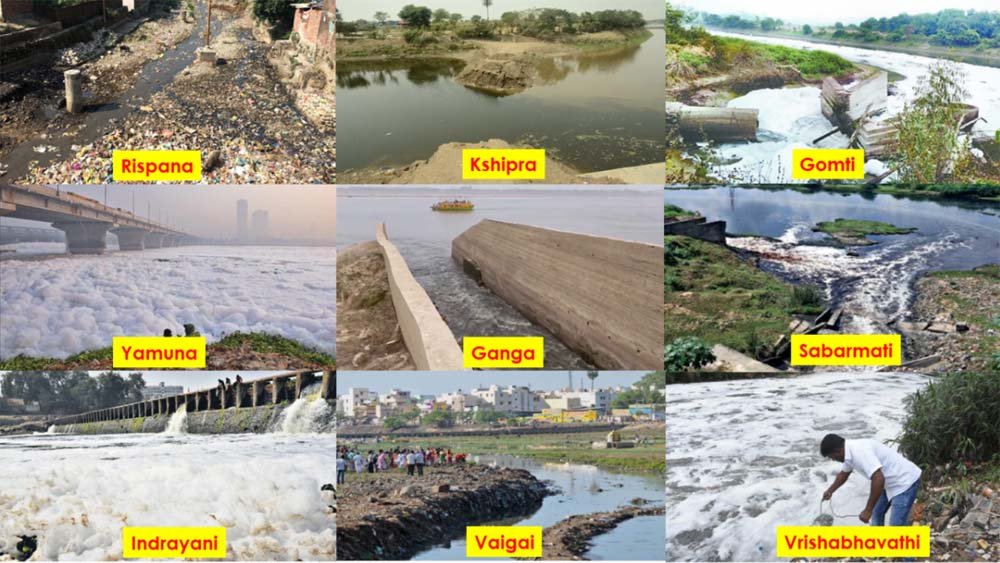
Water Pollution and its Concept!
Water is one of those things that is provided by the environment to us and which is completely inevitable in human life it is so important for us because without it we can’t survive and not only us even other living organisms present in the environment will also not be able to survive without water, so we hope that till now you must have understood the importance of water. But as the population is increasing rapidly so the requirement of water is increasing as well. But along with other aspects, there is another problem that comes in front of us and that is water pollution, which is a serious concern and needs to be tackled properly. Water pollution is simply the contamination or degradation of water bodies like lakes, rivers, oceans, groundwater, and other small bodies like ponds and streams. Water pollution happens when some harmful substances whether natural or unnatural enter into these water bodies and disrupt their composition and ultimately make them unfit for various usages like drinking, bathing, swimming, and sustaining aquatic life. Water pollution is something that leads to some serious problems and it will continue to trouble us in the form of creating issues for future generations. So, it is our responsibility to ensure that these waters do not get polluted, and for that matter, one should install wastewater treatment plants through wastewater treatment plant manufacturers.
Causes Behind Water Pollution
Since we have understood clearly what is water pollution then it's time to understand the root cause behind it, so that those reasons can be targeted and the level of pollution can be minimized. Below are discussed some of the causes of water pollution in India:
- Industrial Activity- One of the major sources of water pollution is the industrial activity where production and other industrial activity take place and these complete processes release too many chemicals such as heavy metals, and toxic substances into the water bodies without their treatment. So, an effluent treatment plant is a must for industries that can be easily installed by contacting a sewage treatment plant manufacturer.
- Agriculture Practices- In agriculture, the application of pesticides, herbicides, and fertilizers can cause runoff of these chemicals into surrounding water sources, which leads to contaminating them. The farming of livestock can also contribute to water contamination, through the release of animal waste and excess nutrients.
- Municipal Waste- Pathogens, organic waste, and other contaminants can enter water bodies when sewage and wastewater from residential areas, commercial buildings, and municipalities are not properly or adequately treated. That’s why it is important to install a water treatment plant through a water treatment plant manufacturer.
Effects of Water Pollution

There are several negative effects of water pollution on the environment, human life as well as aquatic life. Below are some of the effects of water pollution that will make us realize why a water treatment system is necessary to install.
Human Health and the Impact on it- Humans who use contaminated water are prone to significant health risks. Cholera, typhoid, dysentery, and hepatitis are a few examples of waterborne illnesses that can spread through contaminated water sources. Consuming or coming into contact with contaminated water rather than installing RO plants through a RO Plant Manufacturer can cause respiratory problems, skin infections, gastrointestinal disorders, and even long-term health concerns.
Loss of Biodiversity- Aquatic environments can suffer a lot from these water pollution, which also reduces biodiversity. Fish, amphibians, reptiles, and other aquatic invertebrates can lose their life to pollutants in the water. Ecological imbalances, species extinction, and disruption of food chains can result from ecosystem disruption and that’s why one has to install a water treatment plant through an ETP Plant Supplier at all the sources from where the wastewater is coming out in a huge volume.
Economic Consequences- Economic effects of water pollution can be enormous. Industries that rely on clean water supplies, such as fishing and tourism, may be impacted by contaminated water. Communities and governments may be burdened by the cost of cleanup and remediation as well as medical costs associated with waterborne infections.
A Solution to the Water Pollution
Water pollution in India is a serious issue you will be surprised to know that still the majority of the population is not getting pure or fresh water to drink, that’s why to negate water pollution there is a requirement of regulatory measures, pollution prevention strategies as well as individual actions. Therefore, In this section of the blog we are going to discuss about some of the solutions that we can own in order to prevent water pollution-
- Improvisation of wastewater treatment- To ensure that sewage and industrial effluents are properly treated before being discharged into aquatic bodies, upgradation, as well as the expansion of the wastewater treatment plant, is required. Also, there is a requirement of using cutting-edge treatment techniques to efficiently remove contaminants, such as nutrients, heavy metals, and dangerous compounds.
- Sustainable Agriculture- Promote organic agricultural methods that employ the least amount of pesticides, fertilizers, and herbicides. Reduce chemical runoff and soil erosion by practicing integrated pest management, crop rotation, and precision agriculture. Create wetlands and buffer zones to catch agricultural runoff before it reaches aquatic bodies.
- Preserve and Restore Riparian Zones- Riparian zones, or the areas of vegetation around rivers, streams, and lakes, should be preserved and restored. These areas serve as organic barriers that filter pollutants and stop soil erosion. In particular, areas, planting native plants aids in bank stabilization, runoff reduction, and water quality improvement.


